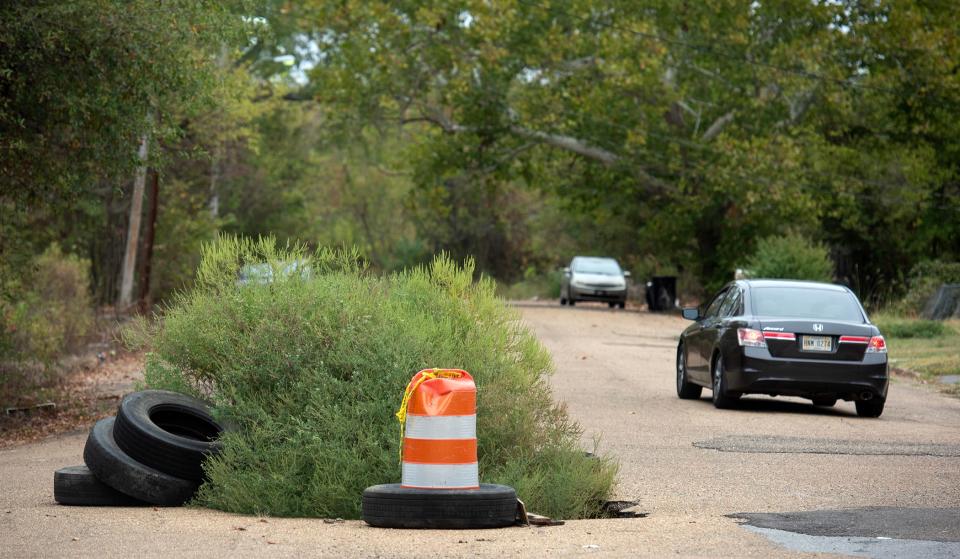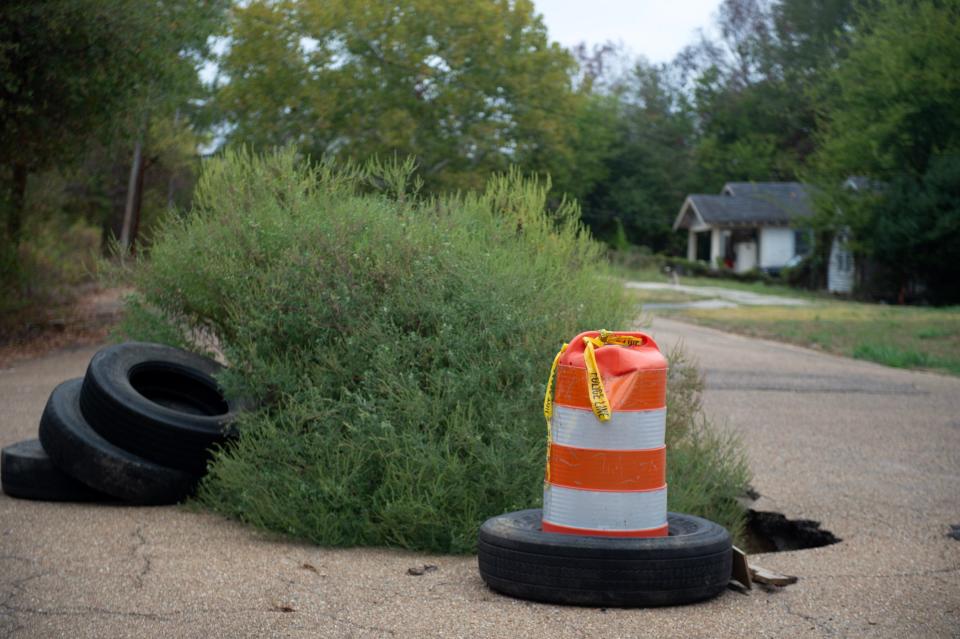Weeding out the problem: 6-foot ragweed plant grows out of pothole in west Jackson
Some may call it a pothole. Some might say it's a sinkhole. Drivers may confuse it with a roundabout.
Regardless, you can't miss it.
A west Jackson pothole has a 6-foot-tall ragweed plant growing out of it in the middle of the road, soaking up the sun. According to the Mississippi Department of Wildlife, Fisheries and Parks ragweed is typically found in sites "such as new forest plantations, thinned forest stands and along roadsides and other openings."

The pothole ragweed plant in question can be found at the intersection of North Denver and Long Streets. It started growing at the bottom of a pothole in the road caused by a sanitary sewer failure, according to both Robert Lee, the interim director of the Department of Public Works, and federally appointed Third-Party Water Administrator Ted Henifin.
Ragweed is a common plant found throughout Mississippi that usually starts growing in the spring and summer, with leaves 1 to 4 inches long and 2 inches wide. It's a common food source for a number of different species, such as deer, birds and butterflies.
The particular ragweed plant growing out of the west Jackson pothole most likely started growing in the spring, officials said.
"It came up from a seed back in the spring and they get big. They get can get bigger than a Volkswagen," said Felder Rushing, a veteran horticulturalist who helped identify the plant.
Rushing, an 11th-generation American gardener, is the host of "The Gestalt Gardener," a weekly radio program he has been presenting for 15 years on Mississippi Public Broadcasting and NPR. He is also the author of over 30 gardening books and lectures at universities throughout Mississippi and the United States. He currently resides in Fondren, though when the Clarion Ledger spoke to him he was living in England where he travels for the winter.
"I'm the yard and garden guy," he said.
This isn't the first time Rushing said he has seen a plant grow out of the ground due to sewer failures in the city.
"It's not unusual. I've seen holes in the road where tomato plants are growing in these things," he said, chuckling. "I'm not making this up. I've seen this in Jackson. I've even planted stuff on purpose in a sinkhole (in Jackson). I wrote about it actually in the Clarion Ledger and the city came out and fixed it the next day. …"
Rushing said the ragweed plant will die once cold weather or a freeze comes to town. He said it's an extremely common plant in the state.
"It comes up from seed every spring," Rushing said. "Every plant makes 'gazillions' of seeds. They blow all over everywhere, and when they sprout, each one can grow into a plant that's as big as a refrigerator," Rushing said.
The size of a ragweed plant may be impressive but if you have allergies, don't get too close.
"If you thump a ragweed with your finger, a cloud of pollen floats away," Rushing said. "In the summer and fall, people think plants like golden rods or magnolias cause allergies, but you could stick a golden rod leaf up your nose and it won't make you sneeze. But ragweed pollen? Blowing around in the wind? That's one of the No. 1 causes of allergies in Mississippi."
To remove it is as simple as pulling it up, he said.
"It's like plucking eyebrows," Rushing said. "It's not like a woody tree, it just pulls up real, real easy."
A deeper look at potholes in Jackson: Fixing Jackson's pothole problem: An overwhelming task for a division with 10-12 workers
How to weed out the 'mother of all potholes'
Lee said that though most people would assume a giant hole in the road is a pothole, it's actually a sanitary sewer failure. When shown a picture of the ragweed, Lee pointed to a manhole just to the north that led him to the conclusion.

"I see that manhole there and that tells me there is a sanitary sewer or storm drain failure in this area and the dirt that was above the pipe where it failed, washed out, took the road down with it and expanded over time," Lee said. "Then something fell in there and a tree started growing. Now this looks like the mother-of-all potholes. But this is a utility failure."
Lee couldn't say how long the sinkhole has been there, but looking at the photo, he said, "It has probably been there a considerable amount of time."
Since the failure has been confirmed as a sewer issue, fixing it falls under the charge of the man who is also repairing the city's water system — Henifin. He was put in charge of fixing the city's sewer system in October in a stipulated order signed by U.S. District Court Judge Henry Wingate.
Henifin also confirmed the pothole was caused by a sanitary sewer failure, which is caused when a pipe collapses. JXN Water has fixed over 50 sewer failures throughout the city so far, "but there's probably 300 to 400," Henifin said, and to fix them usually costs anywhere from $15,000 to $20,000.
"That one's got an amazing tree in it," Henifin said when showed a picture. "Normally you would come out, dig down and fix that little piece of pipe. But if you let it go for years, now there's a hole in the pipe that lets rain water take soil away from the roadbed and so as more and more soil disappears and goes in our sewer system it becomes a bigger void and then it turns into a place for a tree to drop in and grow."
Raw sewage in Jackson homes: Backed up sewage destroyed their homes. Now a fight with the city over who's responsible
JXN Water Spokesperson Ameerah Palacios said she spoke with engineers who told her the pothole at North Denver and Long Streets is "an eyesore, yes, but in the bigger context of all the sewer failures in Jackson right now, it's a low priority. We have significant money limitations on sewer side, so prioritization is based on impact to customers."
The main focus right now is finding sewer failures that are causing overflow or back ups into a structure or a resident's house, as well as to other sensitive properties such as playgrounds, schools or high traffic areas, Palacios said.
"A flowing collapse will be much lower in priority," Palacios said. "Doesn't mean it's not important, we just have limited means."
Unlike the city's water system, which received $600 million in federal funding for repairs after the 2022 water crisis, the equally beleaguered sewer system has no federal dollars going toward it. In an effort to bring in funds, Henifin announced the city's water rates will be raised in 2024. The additional revenue will be partially used to fix the sewers.
Along with the hundreds of sanitary sewer failures, Henifin and JXN Water have also been charged with repairing 215 raw sewage overflows reported throughout Jackson. Raw sewage overflows occur when there is a "a break in a sewage pipe allowing the sewage to pressurize and come up above ground," Henifin said in a JXN Water Youtube video released in August.
Know of any other infrastructure issues in Jackson? Contact Charlie Drape at Cdrape@gannett.com.
This article originally appeared on Mississippi Clarion Ledger: Weeding out the problem: See what's growing out of pothole in Jackson

